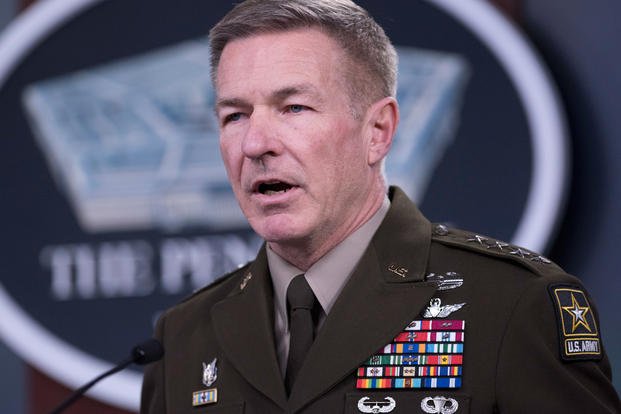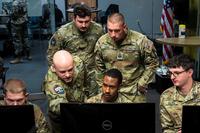After a year of unprecedented use of the National Guard at home while it still juggles its combat missions abroad, military leaders say their goals are to slow the operational tempo and to provide health care for the force.
"Our force has been heavily committed over the past 20 years in Iraq, Afghanistan, Syria and around the world," Army Chief of Staff Gen. James McConville told lawmakers Wednesday during a House Appropriations Committee hearing on the service's budget. "My concern is we want to make sure we reduce the op tempo of our troops, including the National Guard who have been heavily employed, whether that's home or overseas."
The past year has seen unusually high use of the National Guard at home as it has been deployed virtually nonstop to handle pandemic relief and civil disturbances, administer vaccinations, and protect the U.S. Capitol after the pro-Trump mob assault in January.
Read Next: Gallagher Claims SEAL Platoon Agreed to Practice Medical Procedures on Dying Prisoner
Currently, there are 32,000 Guardsmen supporting pandemic efforts and just over 2,300 on civil disturbance missions in Georgia, Minnesota and Texas, according to the National Guard Bureau. That includes the Capitol security mission in Washington, D.C. Roughly 20,000 troops are deployed abroad in places such as Iraq, Afghanistan and the horn of Africa.
The extensive string of domestic missions has the potential to be a massive strain on the force. Guardsmen must maintain their civilian jobs and have no legal protections from employer retaliation while on state orders. They also aren't provided with child care.
Gen. Daniel Hokanson, the head of the Guard, told lawmakers Tuesday that the lack of a free and premium health care service for troops is a key issue, one that Congress may need to address.
"What happens if they get sick or injured when they come off orders?" Hokanson said during a House Appropriations Committee hearing Tuesday. "One of my most pressing concerns is premium free health care for every Guardsman who serves in uniform."
In their conventional roles, Guard members are entitled to purchase health and dental coverage through Tricare. Yet Hokanson's comment comes as lawmakers are increasingly examining the benefits and pay gap between National Guard troops and their active-duty counterparts.
Some have argued that bureaucracy and fine print on how troops are activated on domestic missions can unfairly strip Guardsmen of their benefits.
While on state orders, troops cannot file claims with the Department of Veterans Affairs if injured, do not earn a full housing allowance, or accrue benefits such as the GI Bill. However, if that same mission is federalized under Title 32, which keeps troops under state command but sends the bill to the federal government, Guardsmen earn all benefits and are entitled to the same health care as their active-duty counterparts -- but only after 30 days of service and if the president declares an emergency.
There is no bill on the table to provide free health insurance for Guard troops when they're off duty. So far, most efforts to achieve benefits parity for the Guard have focused on the GI Bill.
Delivering health insurance to the 441,539-strong force would be a massive expense for the government, but Congress appears to be in the early stages of looking into it.
"We're going to have a panel that addresses health services. Some things we need to understand is who lacks health insurance, whether or not folks have chosen not to sign up for it -- I want to see how this breaks down by state," said Rep. Betty McCollum, D-Minn., the chair of the House Appropriations Committee's defense panel. "I need to understand how Tricare fits into this."
-- Steve Beynon can be reached at Steve.Beynon@military.com. Follow him on Twitter @StevenBeynon.
Related: How the Pandemic Spurred Congress to Rewrite GI Bill Rules for the National Guard












